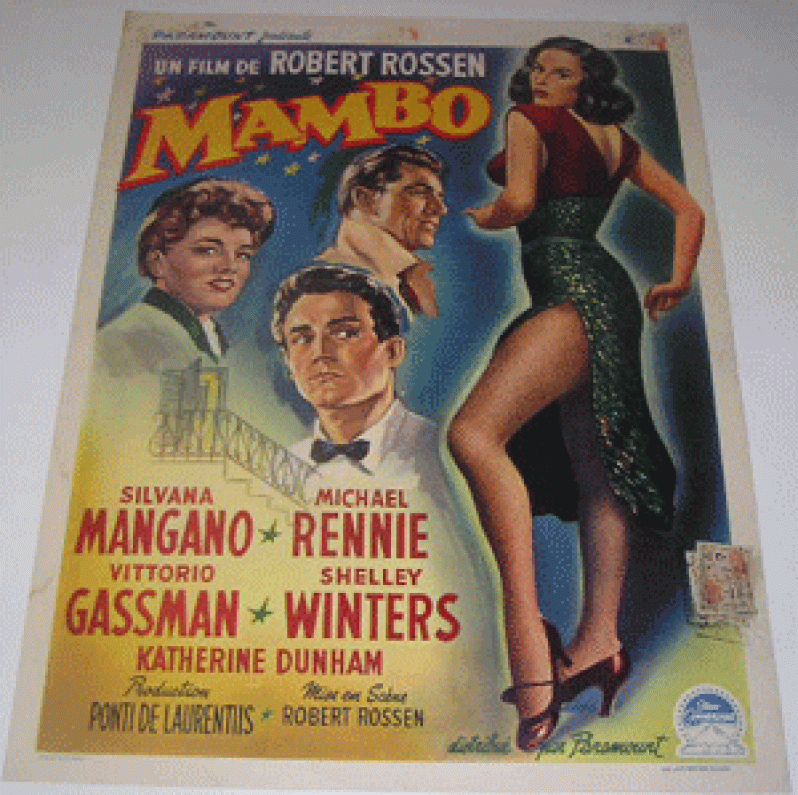WITH ‘Bitter Rice’, Mangano inspired a whole new style of Italian filmmaking which evoked the sensual, saucy nature of peasant females who rode donkeys, drew water from collective wells, cooked, gossiped, sold peasant food, took care of family members, drank wine, and, of course, often tumbled in the hay with their persuasive male counterparts.  This cinematic style, by going straight to the heart of a working-class lifestyle, within the context of its original rustic village environment bearing an Epicurean tradition, lit up the pleasure nerve enjoyed and sustained by Italian (and foreign) cinephiles. Socialist message films, with their obvious harping on alienation and exploitation as topics out to prove an a priori polemic, could not compete with these gregarious ‘people’ oriented films, and remained mostly the interest of like-minded leftist intellectuals.
This cinematic style, by going straight to the heart of a working-class lifestyle, within the context of its original rustic village environment bearing an Epicurean tradition, lit up the pleasure nerve enjoyed and sustained by Italian (and foreign) cinephiles. Socialist message films, with their obvious harping on alienation and exploitation as topics out to prove an a priori polemic, could not compete with these gregarious ‘people’ oriented films, and remained mostly the interest of like-minded leftist intellectuals.
Two brilliant and vivacious Italian actresses emerged to run with Mangano’s ‘Bitter Rice’ influence: Sophia Loren and Gina Lollobrigida. And they went on to master a variety of roles unforgettably. Indeed, if a festival of Mangano, Loren, and Lollobrigida’s selected films from their early years onward were ever presented, only viewers with hearts of stone would not be changed in some way.
Lattuada’s ‘Anna’
Mangano never looked back to any film role comparable to what she had demonstrated in ‘Bitter Rice’; she differed noticeably from Loren and Lollobrigida by the distinct and arresting social values consistently presented by her roles and films to follow. Yet, the ‘cult’ status female role did not seem to be able to easily separate itself from Mangano, and in 1951, it came back startlingly with her second important film, ‘ANNA’, directed by another noted Socialist-oriented director, Alberto Lattuada.
However, Lattuada was not really a political polemicist in his films, but a quiet, sensitive purveyor of social values rooted in instinctive human goodness. Lattuada was clearly influenced by the social optimism and positive ideals of classic Hollywood directors of conscience, like Frank Capra and Preston Sturges.
‘Anna’, played provocatively by Mangano, is the story of a beautiful, ambitious, glamorous prostitute in Italy’s post-war reconstruction who converts to being a Roman Catholic nun. The film shot like truth serum through the veins of the Italian public who have been known to love being challenged by the Arts, especially music, painting and sculpture, film, and fashion.
‘Anna’ ended up being the first Italian film to gross over one billion Lire in the 1950s, according to Mira Liehm in her informative study of Italian cinema, ‘Passion and Defiance’, University of California Press 1984.
Distinct style
Mangano’s beauty and fashion was stunning in ‘Anna’, and set a pace for other actresses, among whom Loren and Lolllobrigida again stood out, but nevertheless never paralleled Mangano’s audacity and suggestiveness in most of her roles to come.
‘Anna’ questioned the limits of the Catholic Church’s value of forgiveness and tolerance with its startling theme. But as was said before of director Lattuada, his belief in ideal human goodness above social convention or religious dogma put ‘Anna’ in the front row of culture as an exploration of social and religious tolerance intertwined.
The character, Anna, is not simply one of those typical examples of a ‘bad girl’ who repents and turns to God; Anna moves to the inner role of God’s servant as a nun, not a parishioner. She moves from the pleasures of the body, to the totally ascetic pleasures of the ‘soul’ after her vowed renunciation of the world’s materialism and sensual pleasures.
By 1954, a unique Hollywood director like Robert Rossen, who had already invoked the paranoia of the Cold War ‘House of Un-American Activities’ committee with his outstanding conscientious American films like ‘BODY AND SOUL’ (1947) and ‘ALL THE KING’S MEN’ (1949) ushered in Mangano’s brief spell of work in 1950s America, where she was obviously delighted to once again show her skill as a Jazz dancer, this time among actual Latinos and Afro-Americans in Rossen’s light-hearted ‘MAMBO’.
With one hand on her beautiful belly, Silvana Mangano, in some outstanding scenes, moved her slim, highly sensual body like a genie over a low, seething flame, representing in this film the very essence of the corporeal and sensual female ‘soul’, while her facial expressions flickered with the secrets of inner contentment.



.jpg)









